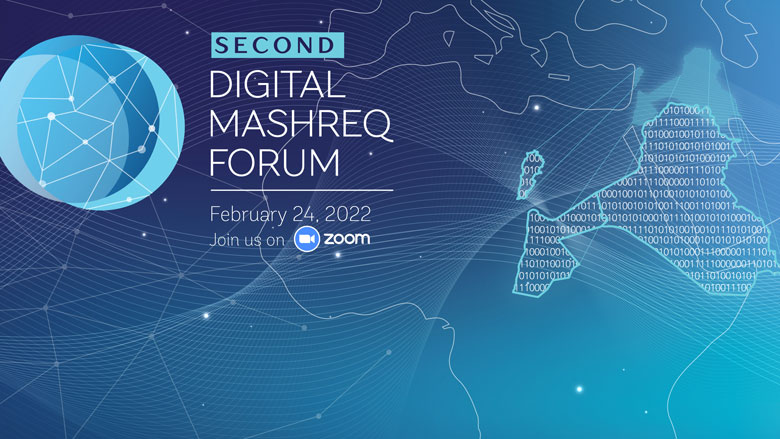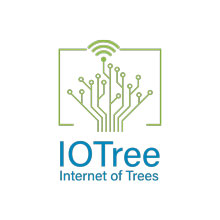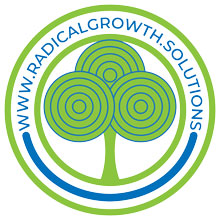Second Digital Mashreq Forum
Iraq, Jordan and Lebanon Reconfirm Commitment to Digital Transformation for Economic Growth, Diversification, and Closer Government-to-Citizen Interaction
On February 24, 2022, Iraq, Jordan, and Lebanon reconfirmed their commitment to pursue efforts toward the digital transformation of their economies for greater accountability and transparency, and to foster regional cooperation to position Mashreq as a regional digital economy hub.
This renewed commitment came during the Second Digital Mashreq Forum, which was organized by the World Bank Group (WBG) and brought together high-level officials and private-sector representatives from Iraq, Jordan, and Lebanon, as well as entrepreneurs, investors, and executives from international and regional businesses over a day of virtual discussions and knowledge sharing.
Building on the success of prior digital economy events led by the WBG and the governments of Iraq, Jordan, and Lebanon – including the inaugural Digital Mashreq Forum in Amman (June 2019), the Mashreq ministerial round table on the digital economy (February 2021), and the three Mashreq national workshops on the digital economy (June 2021) – the Second Digital Mashreq Forum served as a platform to gauge the progress made by the three governments on digital reforms, explore opportunities for regional collaboration and integration in the post-COVID-19 recovery phase, and scale up public-private sector dialogue and networking.
“The digitization of government, digital payments, and expanding broadband access in the three countries will offer opportunities for additional investments, more job creation, more stability, and more peace in this region”, said Saroj Kumar Jha, World Bank Mashreq Regional Director, in his opening remarks.
Lebanese President of the Council of Ministers Najib Mikati added that “the crisis has highlighted the importance of governance, transparency, and accountability for Lebanon’s economic recovery and resilience” and has fast-tracked digital transformation through IMPACT, the inter-ministerial platform under Lebanon’s Central Inspection Bureau. Mikati also committed to “the adoption of a comprehensive digital transformation and digital skilling strategy for Lebanon before the upcoming elections on May 15, and to making e-government a priority to renew public trust in state institutions.”
“Digital transformation is a cornerstone of our transformation to regain citizen trust,” asserted Najla Riachi, Lebanon’s Minister of State for Administrative Reform (OMSAR), stressing on the need to build a regional digital literacy and upskilling platform for both citizens and public-service employees. “Through IMPACT, Lebanon has automated COVID-19 vaccine registration for six million individuals and administered five million doses to date, achieved EU equivalence for its COVID-19 vaccine certificate, and supported social assistance for nearly 600,000 registered beneficiaries – representing some 2.25 million individuals in the country”, said Riachi.
Jordan’s Minister of Digital Economy and Entrepreneurship, Ahmad Al Hanandeh, stressed that “digital transformation is no longer an option. It is a necessity for the prosperity of future generations […] If we are not part of digital transformation today, we will be left behind.” Hanandeh added that almost all of Jordan’s public institutions are connected through the government-owned fiber optic network, which will soon be open for private sector participation. Al Hanandeh highlighted the inevitability of digital disruption both within and beyond the financial sector, and he highlighted the importance of cooperation between Mashreq governments to advance digital transformation at a regional level, a successful example being Jordan’s outreach to Lebanon to fast-track Jordan’s deployment of the EU-compatible digital COVID-19 vaccination certificate.
Following the opening sessions, the Forum gathered experts to discuss four focal areas in depth: 1) Opportunities for the regional integration of broadband networks; 2) enablers and obstacles to the widespread adoption of digital financial services; 3) ways to improve the digital skills of the youth and working-age population to prepare them for the jobs of today and tomorrow; and 4) digital government platforms and initiatives for efficient, transparent, and accountable public-service delivery system in Mashreq. The Forum also featured six early-stage agritech startups from the Mashreq region, whose founders delivered pitches and benefited from the guidance and feedback of experienced mentors.
The broadband panel highlighted the importance of regional broadband networks for the socioeconomic development of the Mashreq region. In particular, the panel stressed the need to build an ecosystem that supports a fair and proportionate regulatory framework, noting that good regulation should encourage competition and a level-playing field in digital infrastructure. When it comes to digital services, it is important to ensure the security and privacy of applications and services, using regulatory sandboxes as a tool to deal with everchanging technology in the sector. Considerable emphasis was placed on the need to develop private data centers and regional Internet Exchange Points (IXPs), and to facilitate access to widespread and inclusive cloud-based services to build social and economic resilience. In particular, the cross-border transfer of data is seen by the private sector as a key enabler to scaling up digital platforms and cloud-based services across the region. With an explosive bandwidth capacity growth reaching 35 percent yearly, a conducive enabling environment can unleash the potential of Mashreq to become a regional digital hub.
With respect to digital financial services, panelists discussed progress in terms of access to financial services, with Jordan now having 1.8 million mobile wallet users, and Iraq showing good growth in both bank and wallet accounts. The pandemic served as a catalyst for the digitization of cash transfers and payrolls, and client onboarding and interoperability among financial service providers improved, leading to a better user experience and increased trust. Cash is however still prevalent, notably in Iraq and Lebanon. In the framework of digital transformation and considering the emergence of cryptocurrencies, more work on regulation, infrastructure, and acceptance networks lies ahead.
The digital skills panel noted that millions of digital jobs will be created every year, requiring digital upskilling for workers to remain relevant to the job market. However, digital transformation may exacerbate existing inequities and further widen gaps, especially for women and vulnerable communities, a factor that must be considered when developing strategies and programs. The panelists had several recommendations for Mashreq governments, including the development of a holistic, multi-sectoral vision for the digital economy that enhances digital literacy and skills; the reform of school curricula; raising awareness among parents about the importance of digital skills; equipping public schools with digital equipment; encouraging public-private partnerships; and enabling successful local partners to grow and scale up their programs.
Finally, the digital government panel advocated for three interrelated themes for efficient service delivery: using a purpose-led approach prior to implementing technology solutions; the importance of inclusion by design; and leveraging the technology of tech giants to deliver improved services while providing the appropriate oversight. Panelists also argued that technology per se is neutral, but its applications impact different population groups differently: low female labor participation rates and access to finance, coupled with lower levels of digital skills and device access, have left women and other groups behind. The private sector can take the lead in developing applications that address the needs of women, the disabled and other groups to address equitable access. The panel also highlighted the importance of bringing together the public sector, the private sector, and civil society to implement digital strategies and overcome the high turnover levels in government. In this regard, the private sector can innovate and implement such solutions, while the government provides the oversight, data protection, and security. Along the same lines, the panel highlighted how oversight bodies can play a role in fighting fraud and corruption through digital tools. The panel concluded that smart government goes beyond a digital strategy and requires first and foremost a shift in mindset and an investment in change management efforts to address resistance among governmental workers and leaders. Reliable, clean, and synthesized data to understand what people want and need is primordial, as are public-private partnerships where the government acts as a facilitator that protects consumers, safeguards their data, and ensures citizens understand their data rights.
For its part, the World Bank Group signaled its readiness to continue supporting the Iraqi, Jordanian, and Lebanese governments toward the digital transformation of their economies, and to foster regional cooperation to position Mashreq as a regional digital economy hub.






